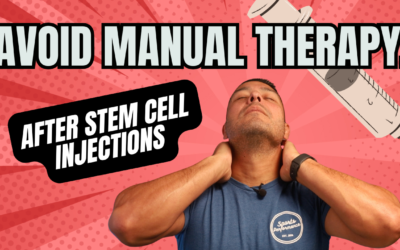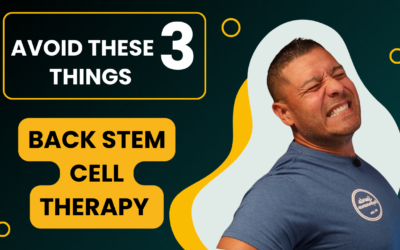“Let’s See How It Goes”
If you’ve undergone stem cell therapy and are now starting physical therapy, it’s essential to ensure you’re working with a therapist who understands the intricacies of stem cell recovery. Stem cell therapy is a specialized procedure, and not all physical therapists are familiar with the unique requirements it entails. Here, I’ll cover the three biggest red flags to look for when assessing whether your physical therapist is the right fit for your recovery journey.
1. They Don’t Have a Recovery Plan
One of the most critical aspects of stem cell recovery is having a structured, long-term plan. If your therapist frequently says things like, “Let’s see how it goes,” that’s a red flag. This indicates they don’t have a roadmap for your recovery, which can negatively impact your progress.
A proper recovery plan outlines what to expect over the next 3, 6, 9, and 12 months. Whether you’re planning a second round of injections or sticking to a single treatment, your therapist should adjust your plan accordingly. Stem cell therapy requires a different approach than standard post-surgery or injury rehab. Your therapist should be able to tell you where you should be at specific points in your recovery and how they plan to get you there.
For example, by week 2, they should anticipate certain progress in your healing. If they’re constantly waiting for you to report how you feel before adjusting the plan, they may not be adequately prepared. Imagine your recovery like a cross-country road trip. If you know you’re supposed to be in Arizona by day three and you’re still in California, it’s a sign you’re falling behind. A therapist without a clear plan leaves you guessing, and that’s dangerous for your recovery.
2. They Give General or Vague Responses
When you ask your therapist questions like, “Is this normal?” or “Should I change my exercises?” and they respond with vague answers such as “Don’t worry about it,” or “Just stay the course,” that’s another red flag. Stem cell recovery is specific and individualized, so you should be receiving precise, actionable advice tailored to your condition and progress.
A skilled physical therapist will be able to say, “At week two, we’ll stop this exercise and progress to level three. By week 16, we’ll start incorporating total body movements.” These types of specific answers show they understand your unique recovery process.
If they’re being general or unsure about your progression, it likely means they’re not familiar with stem cell recovery protocols. This could slow down your healing, making the entire process less effective and possibly risking re-injury or prolonged recovery times.
3. Frequent Flare-Ups Without Explanation
A significant red flag is when you experience multiple flare-ups or extended recovery periods between them. While some inflammation is normal, especially after stem cell therapy, repeated and prolonged flare-ups can be a sign that your physical therapist is pushing you too hard, too fast.
This usually happens when the therapist lacks a proper plan or doesn’t adjust based on your body’s signals. For example, if you feel great after a few weeks of slow, steady progress, they may decide to ramp up your exercises beyond what’s planned. While you might feel good in the moment, this could lead to flare-ups because your body isn’t fully ready.
Even with a top-tier physical therapist, some flare-ups may still occur. However, they should be able to readjust your plan accordingly. For instance, in the early stages of recovery (weeks 0-2), your body will be in an inflammatory phase, and there won’t be much physical therapy. From weeks 2-4, you’ll gradually start with bodyweight exercises, slowly adding more resistance over time. By months 4-5, you should be back to 60-80% of your previous activity level, depending on your body’s response. A good therapist will have these milestones in mind and adjust based on your recovery.
When to Switch Your Physical Therapist
If you recognize any of these red flags, it might be time to consider switching therapists. Your recovery is a significant investment of time, energy, and money, and you deserve to work with someone who is well-versed in stem cell recovery.
It’s not uncommon to partner with multiple therapists or even bring in an outside expert for consultation. If your therapist gets offended by the idea of collaborating with another professional, that’s a sign in itself that you may need to find someone else. Ultimately, your health and recovery should come first.
Final Thoughts
Stem cell recovery is a specialized process that requires a detailed plan, specific answers, and careful progression to avoid setbacks like flare-ups. If your therapist is lacking in any of these areas, it could slow down your recovery or put you at risk for re-injury.
If you’re unsure whether your therapist is the right fit, my team and I can help guide you in finding a more qualified professional for your stem cell recovery. While we can’t guarantee they’ll be stem cell experts, we can help you find someone with the right skills and approach.
Your recovery is important, and working with the right physical therapist is key to achieving long-lasting results. Don’t be afraid to take action if something feels off—your health is worth it.
For more resources or assistance with your recovery, feel free to contact the Stem Cell Recovery Experts who specialize in stem cell rehabilitation. For more recovery tips and long-lasting results, feel free to call us (619-397-1391). We’re here to help!
If you found these tips helpful, don’t forget to subscribe to our YouTube channel (CLICK HERE) for weekly updates on how to recover safely and effectively after stem cell therapy.
If you’re a visual learner, check out the YouTube video I created on this topic:
If you have any questions, please email us at recovery@sportsperformancept.com.
Sincerely,
Dr. Chris Garcia, PT, DPT, SCS, CSCS, USAW

“Dr. Chris Garcia is the world-renowned expert on stem cell recovery, internationally recognized public speaker, and trusted advisor to physical therapists globally.”
Why You Should Avoid Manual Therapy After Stem Cell Injections
"Why You Should Avoid Manual Therapy After Stem Cell Injections"Recovering from stem cell injections is a meticulous process that requires patience and careful adherence to recommended protocols. A common question patients ask is whether manual therapy or massage can...
Low Back Stem Cell Recovery: Avoid These 3 Common Mistakes
"Low Back Stem Cell Recovery: Avoid These 3 Common Mistakes"Recovering from stem cell injections in your low back can be a transformative journey, but knowing what to avoid is just as important as knowing what to do. Many people unknowingly make mistakes that lead to...
3 Ways to Sleep Better After Stem Cell Injections
"3 Ways to Sleep Better After Stem Cell Injections"Did you know that your sleep plays a vital role in maximizing your recovery after stem cell injections? Sleep is the body’s time to heal, regenerate, and rebuild. Whether your injections were in your shoulders, low...
Subscribe
Get notified with new blog posts to heal after stem cell therapy



